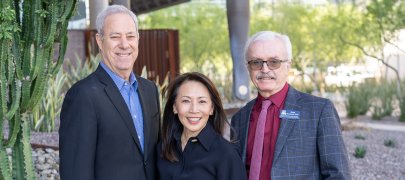
Five Guidelines for Safe Solar Eclipse Viewing

Mandi Conway, MD, chair of the Department of Ophthalmology, shared some best practices for safely viewing a solar eclipse.
Five Guidelines
- No Homemade Filters: Never use improvised or homemade filters when observing a solar eclipse. Only use approved solar viewing glasses or handheld solar viewers with ISO 12312-2 compliant filters to ensure adequate eye protection.
- Inspect Your Filters: Before use, carefully examine your solar filter or eclipse glasses. Any scratches or damages should be a red flag, indicating that the protection may be compromised.
- Follow Instructions: Read and adhere to the instructions accompanying your solar filter or glasses. It’s essential to ensure correct usage, especially when helping children with handheld solar viewers.
- Cover Before Looking: Stand still and cover your eyes with the solar filter or viewer before directing your gaze at the sun. Afterward, turn away and remove the filter — never remove it while looking at the sun.
- Avoid Optical Devices: Never use cameras, telescopes, binoculars or similar devices without a proper solar filter. This caution extends to wearing eclipse glasses or holding a solar viewer simultaneously. The intense solar rays can damage both the filter and your eyes.
Topics
About the College
Founded in 2007, the University of Arizona College of Medicine – Phoenix inspires and trains exemplary physicians, scientists and leaders to optimize health and health care in Arizona and beyond. By cultivating collaborative research locally and globally, the college accelerates discovery in a number of critical areas — including cancer, stroke, traumatic brain injury and cardiovascular disease. Championed as a student-centric campus, the college has graduated more than 800 physicians, all of whom received exceptional training from nine clinical partners and more than 2,700 diverse faculty members. As the anchor to the Phoenix Bioscience Core, which is projected to have an economic impact of $3.1 billion by 2025, the college prides itself on engaging with the community, fostering education, inclusion, access and advocacy.


